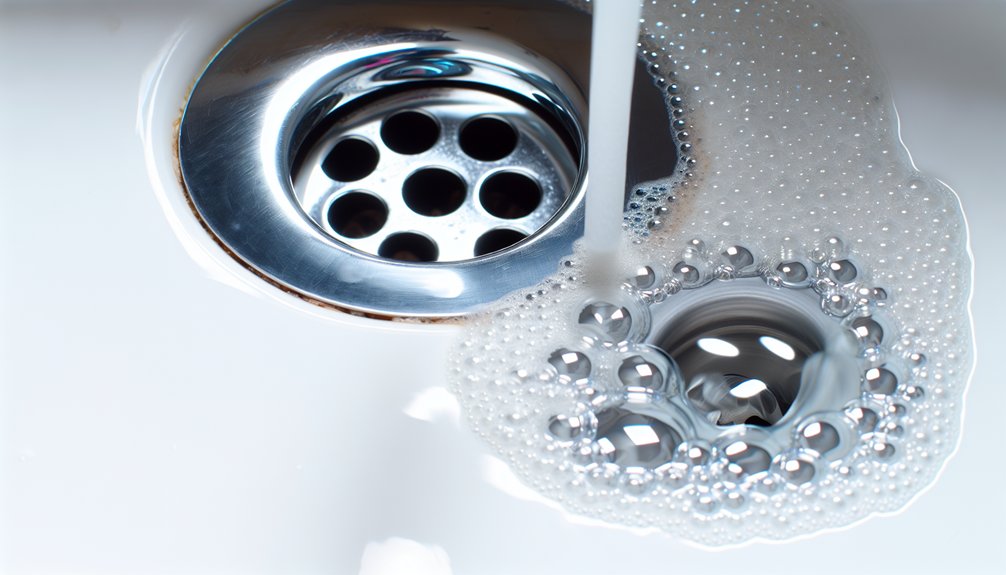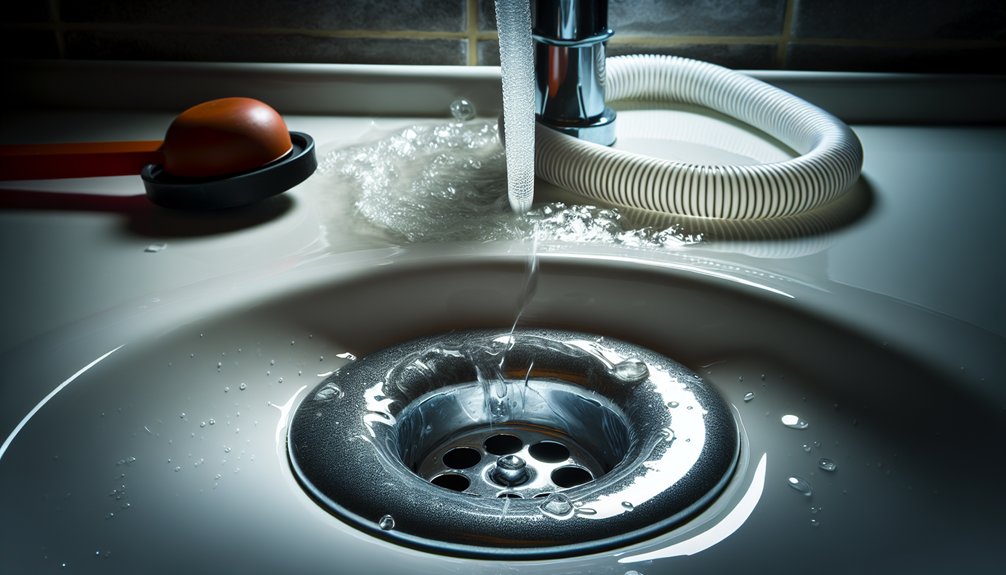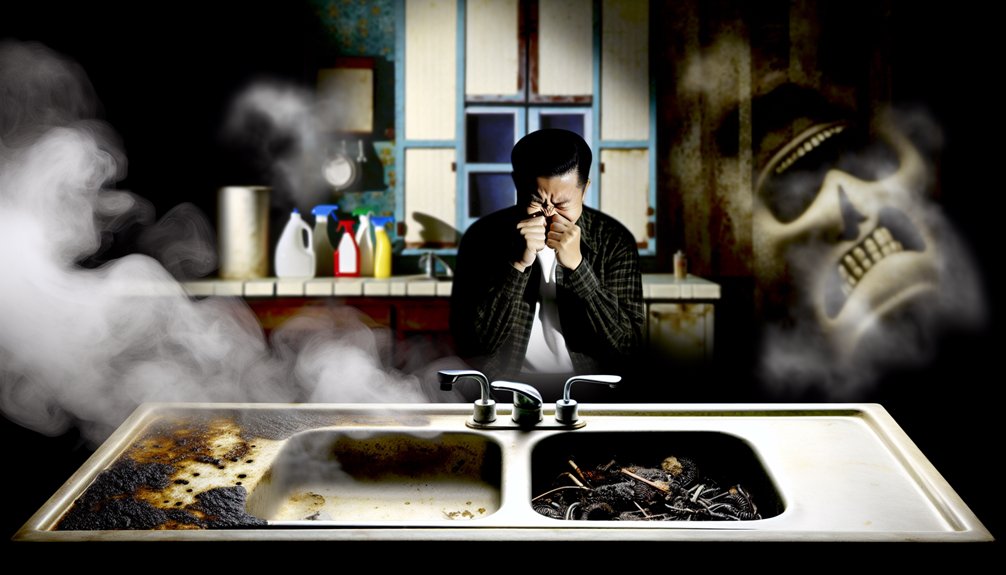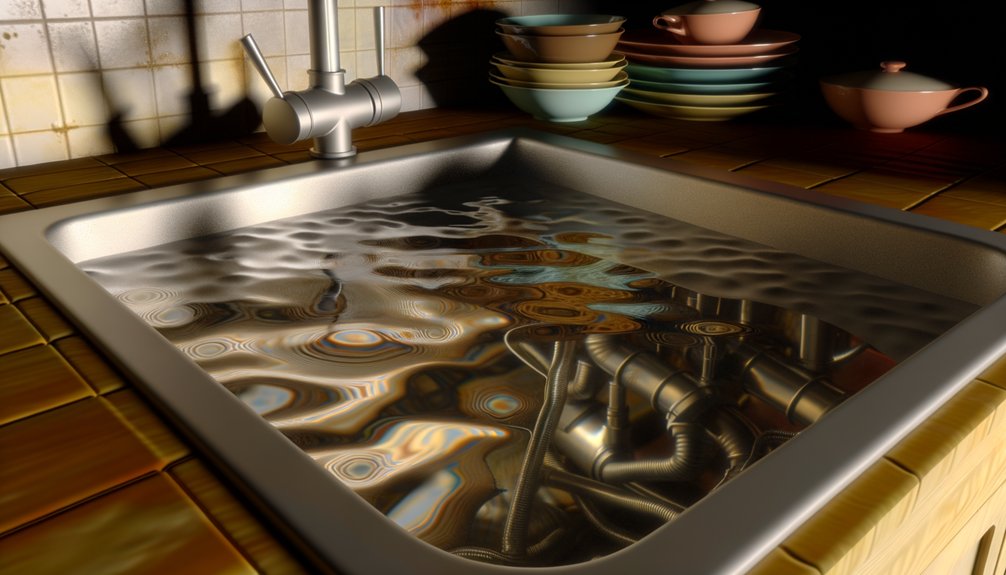Seven signs indicating the need for drain maintenance services include slow drainage, standing water, frequent clogs, plumbing backups, unbearable odors, increased water bills, and unexplainable gurgling sounds. Slow drainage and standing water suggest blockages that can escalate into serious plumbing issues. Additionally, persistent odors and increased water bills signal harmful leaks. Gurgling sounds often indicate trapped air bubbles due to clogs. Understanding these signs is essential to prevent costly repairs and maintain plumbing health. More insights follow.
Slow Drainage

Slow drainage can often indicate underlying issues within a plumbing system that require attention. This phenomenon typically arises from clogged drains, where debris such as hair, soap scum, and grease accumulate, restricting water flow. A noticeable sign is when sinks fill during handwashing or teeth brushing, suggesting a shallow blockage that warrants prompt attention to prevent escalation. If neglected, slow drainage can lead to standing water, increasing the risk of backups and potentially flooding the home, which poses significant inconvenience.
To mitigate these plumbing problems, regular maintenance services are essential. Homeowners can avoid costly repairs by scheduling professional drain cleaning and addressing drain blockages before they worsen. Ignoring slow drains not only invites more severe issues but may also necessitate professional intervention for deeper blockages. Prompt action is vital for maintaining efficient water flow and preserving the integrity of the plumbing system.
Standing Water
Standing water in sinks, showers, or washing machines often signifies a serious drainage issue, frequently stemming from blockages caused by accumulations of hair, food debris, or grease. This condition can lead to several complications within the plumbing system, making prompt intervention essential.
Standing water in plumbing fixtures indicates serious drainage issues, often due to blockages from hair, food, or grease. Prompt action is crucial.
- Increased risk of backups and flooding
- Potential for water damage to surrounding areas
- Health risks due to mold and mildew growth
- Urgent need for professional plumber services
Ignoring standing water can exacerbate drainage issues, resulting in costly repairs and unsanitary conditions. By addressing these clogs swiftly, homeowners can mitigate the risk of serious blockage, ensuring a healthier living environment. Regular monitoring and utilizing drain cleaning services can effectively prevent future occurrences of standing water, safeguarding the integrity of the plumbing system and reducing overall maintenance costs. Additionally, maintaining your gutters and downspouts can help direct water away from the foundation, further reducing the risk of standing water.
Frequent Clogs

Frequent clogs can indicate recurring patterns that suggest a more serious blockage within the plumbing system. These persistent issues may stem from underlying plumbing problems that require professional evaluation. Addressing these clogs promptly is essential to prevent further complications and guarantee peak system performance.
Recurring Clog Patterns
How can homeowners identify when their drainage system requires professional attention? Recurring clog patterns often indicate serious underlying blockages that demand specialized intervention. Frequent clogs in multiple fixtures suggest issues with the main sewer line, necessitating immediate professional assessment. Home remedies typically fail to provide a lasting fix, leading to potential unsanitary conditions and property damage.
Signs that point to the need for professional drain cleaning services include:
- Persistent clogs despite DIY attempts
- Water backing up into sinks or toilets
- Regular blockages occurring soon after repairs
- Accumulation of debris or roots in pipes
Utilizing advanced plumbing tools, professionals can effectively address these issues and restore proper drainage, safeguarding the home from further complications.
Underlying Plumbing Issues
Recurring clog patterns can signal deeper underlying plumbing issues that warrant professional evaluation. Frequent clogs may indicate the accumulation of debris and could signify damaged pipes or tree root intrusion affecting the main sewer line. A slow-moving drain, especially if it is part of a network of clogged drains, often points to a serious blockage that requires immediate attention. Home remedies and commercial drain cleaners frequently prove insufficient, highlighting the necessity for a professional drain cleaning service. Ignoring these recurring clogs can lead to increased pressure within the plumbing system, resulting in leaks or burst pipes, ultimately causing significant water damage. Timely plumbing intervention is essential to address these critical issues effectively and restore full functionality to the drainage system.
Plumbing Backing Up
Plumbing backing up signifies a serious issue within a drainage system, typically caused by complete clogs that obstruct the flow of wastewater. This condition can lead to unsanitary environments, increasing the risk of exposure to harmful bacteria and sewage-related health hazards. Delaying action may exacerbate the drainage problem, resulting in more extensive and costly repairs.
Key indicators of plumbing backing up include:
- Overflowing sinks, tubs, or toilets
- Slow draining fixtures
- Unexplained foul odors from plumbing
- Potential water damage to surrounding areas
Professional intervention is essential for diagnosing the blockage and restoring normal flow through thorough drain cleaning services. Immediate attention from experts can prevent further complications, ensuring a healthier home environment and safeguarding against future plumbing issues. Homeowners facing these symptoms should not hesitate to seek assistance to mitigate potential risks associated with clogged pipes.
Unbearable Odors

Unbearable odors emanating from drains often signal trapped debris, grease, or sewage buildup, indicating potential blockages or leaks within the plumbing system. Implementing preventive strategies, such as maintaining P-traps and regular cleaning, can mitigate these unpleasant smells. However, persistent odors that resist cleaning efforts warrant a professional inspection to identify and resolve underlying issues effectively.
Source of Odors
Foul odors emanating from drains serve as a critical warning sign of underlying issues within a home's plumbing system. These unpleasant smells often indicate trapped food particles, grease, or sewage buildup. Ignoring these odors can lead to severe plumbing issues and potential water damage. Homeowners should be aware of the following sources of odor:
- Trapped food particles decomposing in pipes
- Grease accumulation causing clogs in your home
- Sewer gas backflow from blocked fixtures
- Structural leaks leading to unsanitary conditions
To address these concerns, engaging drain cleaning services provided by plumbing professionals is essential. These experts can identify the root cause and perform a professional drain cleaning, ensuring a healthier environment and preventing future issues effectively.
Prevention Strategies
When addressing unpleasant odors from drains, homeowners can implement several effective prevention strategies to maintain a healthy plumbing system. Regularly utilizing drain cleaning services can eliminate trapped debris and organic matter, markedly reducing the risk of clogged drains and associated smells. Running water in unused sinks fills P-traps, effectively preventing sewer gas backflow and mitigating unpleasant odors. It is essential to address persistent foul odors promptly, as they may indicate blockages or leaks that require professional inspection. Such proactive measures can also prevent future complications, including pest infestations and costly plumbing repairs. Ultimately, maintaining plumbing fixtures through routine maintenance and inspection safeguards against water damage and preserves a healthy household environment.
Professional Inspection Benefits
Persistent odors from drains can signal serious underlying issues that require immediate attention. These unbearable smells often indicate trapped food particles or sewage buildup, posing health hazards. Engaging drain cleaning services through a professional inspection offers several benefits:
- Identification of odor sources, preventing further complications such as blockages or leaks.
- A thorough check of plumbing systems, ensuring no hidden areas are overlooked.
- Improved indoor air quality by eliminating harmful gases and bacteria.
- Extensive treatment plans executed by experienced plumbing professionals.
Timely intervention not only eradicates odors but also safeguards the health of occupants, fostering a cleaner, safer environment. Utilizing specialized equipment, plumbing professionals can provide effective solutions to maintain overall drainage health.
Increased Water Bills
A considerable increase in water bills, often exceeding 10%, can serve as a critical indicator of underlying plumbing issues that necessitate immediate drainage maintenance services. Such increased water bills may stem from hidden plumbing leaks, which can waste up to 10,000 gallons of water annually, greatly affecting utility expenses. Homeowners should remain vigilant for water stains or damp spots around fixtures, as these can signal leaks that require professional assessment and prompt repair. Regular monitoring of water usage is essential for identifying unusual spikes that correlate with potential drainage issues. Addressing these leaks swiftly not only conserves precious water resources but also mitigates potential repair costs associated with water damage. By recognizing the signs of increased water bills, homeowners can take proactive steps to secure their plumbing systems and prevent costly future issues through timely drain maintenance services.
Unexplainable Gurgling
Often, homeowners may notice unexplainable gurgling sounds emanating from sinks, toilets, or drains, which can indicate underlying plumbing issues. These sounds often signify trapped air bubbles caused by clogs, suggesting a blockage that requires immediate attention. The gurgling occurs when water struggles to navigate narrow spaces due to debris build-up, potentially leading to:
Homeowners may hear gurgling sounds from drains, signaling clogs that need urgent attention to prevent plumbing issues.
- Issues with multiple fixtures, indicating a broader plumbing problem.
- Complete drain backups, which can result in costly repairs.
- Compromised water flow affecting daily activities.
- Sanitation challenges if left unaddressed.
Ignoring gurgling noises can exacerbate plumbing problems, necessitating professional drain cleaning services. Timely intervention not only restores proper water flow but also safeguards the plumbing system from further complications and expensive repairs. Homeowners should consider regular maintenance services to prevent future occurrences of gurgling and guarantee a smoothly functioning plumbing system.
Frequently Asked Questions
How Do I Know if I Need a Drain Cleaning?
Determining the need for drain cleaning involves recognizing several key indicators. Clogged drains, foul odors, and slow drainage often suggest a buildup of debris. Additionally, gurgling sounds and unusual noises from plumbing fixtures can indicate air trapped in the drainage system. Frequent clogs and water backups may signal deeper plumbing issues requiring attention. A professional inspection is recommended to assess the situation and provide appropriate cleaning services to restore ideal function.
How Do I Know if I Need Sewer Service?
Coincidentally, several sewer blockage signs often manifest together. Unpleasant foul odors and persistent slow drainage can indicate deeper issues. Frequent backups and gurgling noises from fixtures suggest trapped air or potential tree root intrusion. Additionally, water pooling around drains or dramatic increases in water bills might signal hidden sewage leaks, compromising plumbing health. A thorough sewer line inspection by professionals is essential for addressing these concerns and ensuring maximum functionality of the system.
How Often Should You Do Drain Maintenance?
Determining appropriate drain cleaning frequency is essential for ideal plumbing performance. Preventive maintenance tips suggest annual inspections, while older systems may need biannual check-ups. Signs of clogs, such as slow drainage, warrant more frequent care, ideally every 3 to 4 months. Seasonal maintenance advice emphasizes preemptive actions before heavy usage periods. Regular professional service recommendations and DIY drain care enhance drain health indicators, ultimately lowering maintenance costs and extending the system's lifespan, highlighting the benefits of regular cleaning.
How Do You Know if You Have a Drain Problem?
A clogged drain can feel as catastrophic as a flood. Signs of a drain problem include slow drainage, unusual odors, and gurgling sounds, indicating potential plumbing issues. Water pooling around fixtures and frequent backups may suggest deeper blockages. Discolored water can signal contamination, while pest infestations might arise from stagnant waste. Recurring problems often point to unresolved issues, emphasizing the need for timely intervention to prevent escalation and costly repairs.


